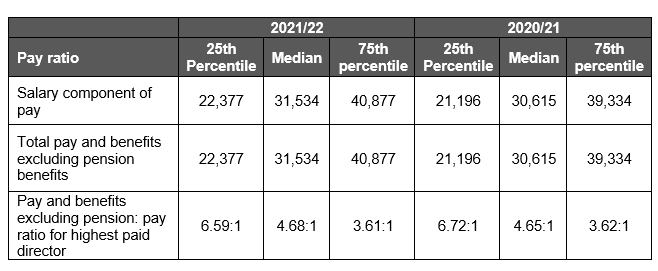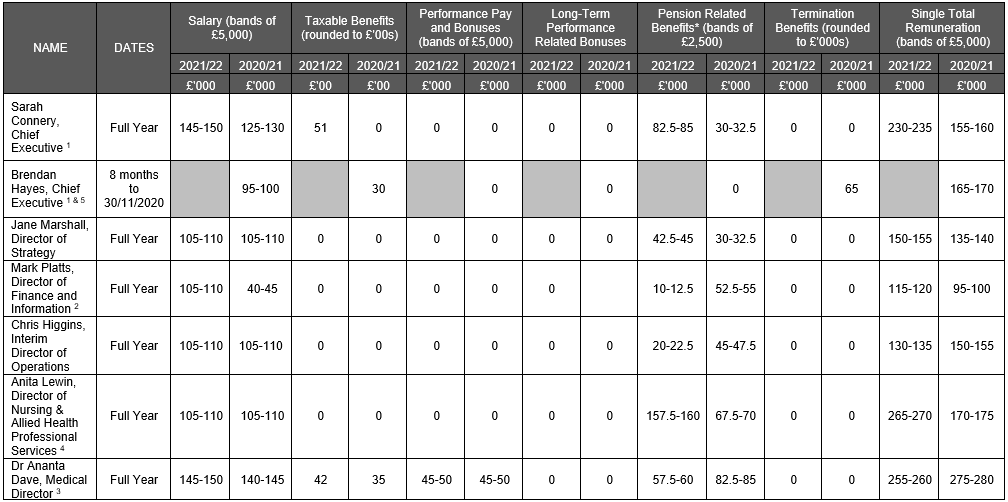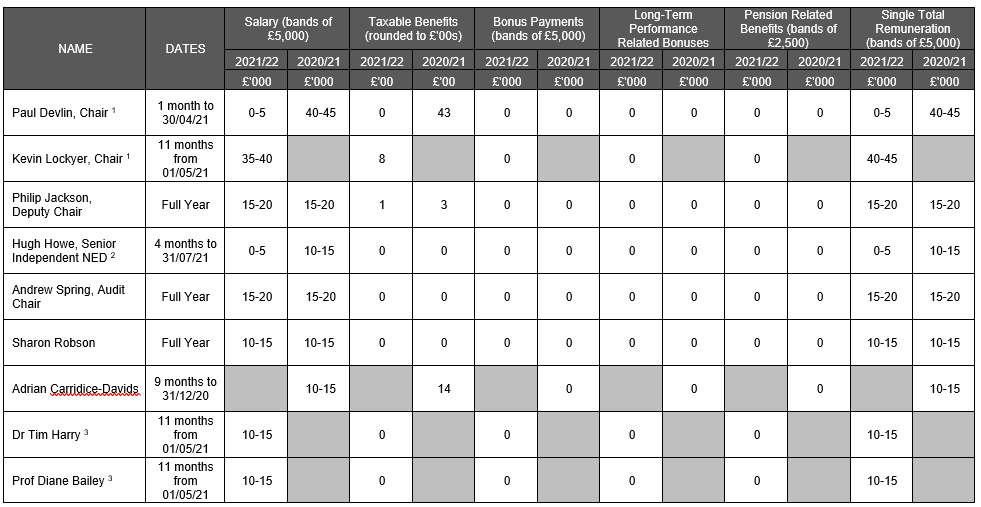Remuneration report
Remuneration for executive directors
These individuals are employed on contracts of service and are substantive employees of the Trust. Their contracts are permanent which have termination of notice clauses by either party of three to six months (dependent upon individual’s contractual terms). There are no compensatory arrangements for senior managers in the event of their termination by the Trust other than those specified within the Agenda for Change national terms and conditions.
The Trust’s normal disciplinary policy applies to senior managers, including the sanction of summary dismissal for gross misconduct. The pay costs incurred on members of the Trust Board is included in the single total figure table in the Annual Accounts.
The levels of remuneration for executive directors and non-executive directors were established in line with national salary surveys obtained from the then Foundation Trust Network and Capita on first becoming a foundation trust on 1 October 2007. The Trust continues to benchmark against the NHS Providers annual benchmarking data. The Trust has not sought any consultation with employees in regard to senior manager remuneration.
The ATS committee has in place an executive directors’ remuneration policy which provides for inflationary uplifts in line with those awarded to staff on Agenda for Change pay scales (where differential awards are made, the Band 9 award will apply to the executive directors). This Policy was reviewed by the Committee in 2021/22. In line with the Executive Directors’ Remuneration Policy; in 2019/20, 2020/21 and again in 2021/22 the executive directors were awarded an inflationary uplift in line with the Agenda for Change conditions.
All executive directors (with the exception of the medical director), receive an annual salary which does not include an option for performance related pay.
All senior managers with the exception of executive directors are remunerated on national Agenda for Change terms and conditions. The Trust deems this to be economically appropriate to the prevailing employment conditions with the NHS.
The medical director had a job split between a clinical role and the medical director role, and received nationally applied enhancements to her Trust salary.
Remuneration for non-executive directors
No inflationary or other local awards were made in 2019/20, 2020/21 or 2021/22. The Trust has received the mandatory guidance (issued in November 2019) on Non-Executive Director remuneration and has now moved to follow this central guidance. The reappointments made in February 2022 and the new appointment made in May 2022 completed the transition from locally set remuneration rates to the national guidance. The previous remuneration levels were very close to those set out in the new guidance, so implementing the guidance has not required any consultation or negotiation.
The components for remuneration for non-executive directors are set out in the table below:

There are no obligations on the Trust which relate to senior manager service contracts.
Future policy table: performance remuneration and contractual arrangements
The salary of executive directors and the remuneration of non-executive directors have no element of performance related pay, with the exception of the medical director’s clinical excellence award (CEA). The 2021/22 Medical Director left the Trust on 15 May 2022, and future award payments will be determined dependant on the successor appointed.
The salary or remuneration represents a single component of the package for each of the directors. The exception of this is the medical director who is a psychiatrist who has clinical duties as part of their role, and the above-mentioned CEA, which is classed as a performance related pay. The medical directors’ clinical duties are an integral part of their salary and are not remunerated in addition to the base salary.
The Trust has not introduced any other elements of performance related pay, at any level within the organisation. There is no specific policy on duration of contracts, notice periods and compensation as these are the same as for other staff. These are in line with the national terms and conditions of service for NHS staff, known as Agenda for Change.
With the exception of salary, executive directors’ (non-medical) terms and conditions mirror the appropriate national terms and conditions, which is Agenda for Change. The Trust’s medical director was employed on medical and dental terms and conditions of employment for consultants. All other senior managers are employed on Agenda for Change.
The Trust does not have a policy for executive directors or senior managers for loss of office. Executive directors and senior managers have a notice period in their contract which is invoked if the individual resigns, or the Trust terminates the contract. In the event of a resignation, the Trust has discretion, like all employers, to vary the notice provision if requested by the employee. The only exception to this is where there is a dismissal for gross misconduct in which termination would be without notice.
Compensation scheme and benefits in kind
There were no payments to senior managers in respect of loss of office in 2021/222 (2020/21: nil). None of the executive directors serve in a non-executive capacity for other NHS trusts and no payments have been made to third parties for the services of a senior manager. Costs for benefits in kind relate to the provision of lease cars.
Remuneration disclosures
Accounting policies for pensions and other retirement benefits are set out in note 1.6.2 of the accounts and details of senior employees' remuneration can be found on the following page, all of which is subject to audit.
NHS foundation trusts are required to disclose the relationship between the remuneration of the highest-paid director in their organisation and the lower quartile, median and upper quartile remuneration of the organisation’s workforce.
The banded remuneration of the highest-paid director in the organisation in the financial year 2021-22 was:
- £190,000-£195,000 (2020-21, £185,000-£190,000).
This is a change between years of 4% (2020/21, 4%).
Total remuneration includes salary, non-consolidated performance-related pay, benefits-in-kind, but not severance payments. It does not include employer pension contributions and the cash equivalent transfer value of pensions.
Of the percentage change in highest-paid director remuneration, 4% was in relation to salary and allowances whilst 0% was in relation to performance related pay which has remained static. (2020-21, 4% in relation to salaries and allowances and 0% in relation to performance related pay).
For employees of the Trust as a whole, the range of remuneration in 2021-22 was from £13,000 to £222,102 (2020-21 £12,517 to £224,886). The percentage change in average employee remuneration (based on total for all employees on an annualised basis divided by full time equivalent number of employees) between years is 4% (2020/21, 7%).
Of this percentage change, there was a 4% increase in salaries and allowances and a 5% decrease in performance related pay. (2020/21, 7% increase in salaries and allowances and 4% decrease in performance related pay.) The initial increase in salaries in 2020/21 was driven by an increase in agency and bank staffing in response to the COVID-19 pandemic as well as the Agenda for Change transitional pay scales. This increased staffing has increased into 2021/22 with the addition of an Agenda for Change 3% pay rise in year.
The percentage decrease in performance related pay is driven by an increase in clinical staff receiving lower value clinical excellence payments in 2021/22. For staff receiving national clinical excellence awards, these payments have remained unchanged for several years.
2 employees received remuneration in excess of the highest-paid director in 2021-22. (2020/21, 1 employee). Thirteen employees were paid over £150,000 (2020/21 12 employees were paid over £150,000) They consisted of:
- 1 medical director
- 1 deputy medical director
- 3 clinical directors
- 8 consultant psychiatrists.
In 2020/21 this consisted of:
- 1 medical director
- 1 clinical director
- 1 deputy medical director
- 9 consultant psychiatrists (on-payroll).
The remuneration of the employee at the 25th percentile, median and 75th percentile is shown in the table below. The pay ratio shows the relationship between the total pay and benefits of the highest paid director (excluding pension benefits) and each point in the remuneration range for the organisation’s workforce.

The ratios for each percentile in 2021/22 are consistent with those in 2020/21
Directors Remuneration
Directors’ remuneration (excluding pension contributions) fell within the following ranges in the table below. The information in the table is subject to audit.

Supporting notes
2021/22 published figures *
- Sarah Connery was appointed as Acting Chief Executive on 12/10/2020 and was made substantive Chief Executive on 06/09/2021. Prior to this, she was Director of Finance and Information. This is her first full year as Chief Executive and her in year increases in salary and pensionable benefits therefore reflect the impact of this change of role.
- Prior to this, Brendan Hayes was appointed as Chief Executive on 1st May 2019 and retired from the Trust on 30th November 2020. As he took retirement, he ceased accruing pension benefits and this value is shown as nil. His exit payment is included within previous year termination benefits and is included within the exit payments comparative disclosure within the remuneration report.
- Mark Platts was appointed as Acting Director of Finance and Information on 23/10/2020 as a result of Sarah Connery's move to Acting Chief Executive. He became the substantive Director of Finance and Information on 12/11/2021. This year's figures therefore reflects his first full year in the role compared to 5 months shown in the comparative columns.
- Dr Ananta Dave is the Medical Director. She received a Clinical Excellence Award payment in year which is shown as performance related pay and bonuses. Approximately 1 day per week is spent performing clinical duties.
- Directors that have Mental Health Officer status receive two years worth of pension benefits for every one year after 20 years within the 1995 Section pension. These individuals therefore have significantly greater pension benefits accruing than those without Mental Health Officer status.
The pension related benefits disclosed arise from membership of the NHS Pensions defined benefit scheme. They are not remuneration paid, but are the value of pension benefits accrued during the year, calculated as the real increase in pension multiplied by 20 ( the HMRC methodology multiplier) , less the contributions made by the individual. The real increase excludes increases due to inflation or any increase or decrease due to a transfer of pension rights. It is a calculation that is intended to provide an estimation of the benefit being a member of the pension scheme could provide.
Salaries and allowances of non-executive directors
The table below shows the salary ranges of non-executive directors:

The information of the table above is subject to audit.
Supporting notes:
- Paul Devlin left the Trust as Chair on 30/04/202 He was replaced by Kevin Lockyer on 01/05/2021.
- Hugh Howe left the Trust on 31/07/2021.
- Dr Tim Harry and Professor Diane Bailey joined the Trust as Non-Executive Directors on 01/05/2021.

